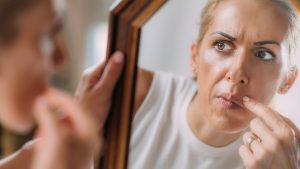Body Dysmorphic Disorder Treatment in Toronto
What is Body Dysmorphic Disorder?

Body Dysmorphic Disorder (BDD) is a serious and treatable disorder in which people spend a lot of time worrying and ruminating about imagined flaws in one or more aspects of their body. Their imagined flaw is either nonexistent or only slight to others. BDD has been found to occur in roughly 2% of the population. BDD should only be diagnosed by a doctor or a trained mental health professional and should only be treated by a mental health professional who specializes in CBT-BDD and who is family with specific protocols for it.
People with Body Dysmorphic Disorder believe that they look disfigured, abnormal, ugly, deformed or not right. Their obsessive thoughts which are intrusive and unwanted are not driven by vanity. It is distressing and impairing to them. Most people with BDD have poor insight as they do not believe that their appearance flaws are actually nonexistent or minimal. Their perception of their appearance may lead to shame, anxiety, despair, overly critical thoughts about their appearance and even self-hatred. They may avoid social situations and leave their home less often. They obsess over their appearance and body image. They make look at themselves in mirrors and other reflective surfaces or avoid them as much as possible and spend excessive time grooming. Their thoughts about their perceived flaws in appearance last at least an hour a day if you add up all the time spent in a day.
People with Body Dysmorphic Disorder often spend 3 to 8 hours daily obsessing about their perceived flaws and a similar amount of time engaging in repetitive compulsive behaviours that are intended to inspect, hide, compare or seek reassurance about their disliked body parts. Their compulsive checking behaviours may provide a sense of temporary reassurance or relief but they are unhelpful because they generally cause an increase in their anxiety and maintain their BDD symptoms. People with BDD often seek out and have unnecessary cosmetic surgeries or other cosmetic treatments to fix their perceived flaws because they see their problems as something physically wrong that needs to be changed rather than as a disorder.
What are the symptoms of BDD?
People with Body Dysmorphic Disorder may:
- Spend many hours a day checking their appearance in mirrors and other reflective surfaces or avoid them.
- Try to camouflage the “flawed” part of themselves from others by spending lots of time grooming and changing their clothes frequently or their posture and engage in re-assurance seeking.
- Touch the perceived flaw to check it, compare their flawed body part to others.
- Seek cosmetic treatment for wrinkles, bumps, marks, or scars that aren’t there or are minor. They may also seek surgery that they don’t need. And if they have the treatment or surgery they tend to be unhappy with the results.
- Think that unless they can change how they look, they won’t be happy, be able to have the relationships they want, or do the things that they want to do in life.
- Be more likely to experience Depression, think about suicide and attempt suicide.
What causes Body Dysmorphic Disorder?
The cause of BDD is largely unknown. There is no single cause for body dysmorphic disorder. BDD is likely resulting from a combination of genetic and environmental risk factors such as an overemphasis on physical perfection and spending a lot of time focusing on perceived flaws and thinking that having these flaws means that they are inadequate or worthless. People with BDD tend to associate beauty with self-worth and happiness. Perfectionism plays a role in BDD as many people with BDD think they need to have a perfect appearance otherwise they feel unattractive.
 It is believed that there is a link between social pressures to have an ideal appearance and how satisfied one is with their body image. Things that happen in someone’s life especially when one is younger can shape one’s attitude towards their appearance. For example, having a parent who was unhappy with their appearance or being given lots of praise for how they looked as a child can make appearance more important to them than to others. Being teased or bullied might lead someone to believe negative things about themself including the way they look. Personality traits such as perfectionism can make someone more vulnerable to developing BDD. Being sensitive to rejection can also make someone worry more about how other people see them. Research suggests that there may be genes which make someone more likely to develop emotional problems in general. However none have been identified for BDD specifically. Research shows that a person’s brain which tends to focus on the details of what are seen rather than the whole picture can make someone more likely to develop BDD.
It is believed that there is a link between social pressures to have an ideal appearance and how satisfied one is with their body image. Things that happen in someone’s life especially when one is younger can shape one’s attitude towards their appearance. For example, having a parent who was unhappy with their appearance or being given lots of praise for how they looked as a child can make appearance more important to them than to others. Being teased or bullied might lead someone to believe negative things about themself including the way they look. Personality traits such as perfectionism can make someone more vulnerable to developing BDD. Being sensitive to rejection can also make someone worry more about how other people see them. Research suggests that there may be genes which make someone more likely to develop emotional problems in general. However none have been identified for BDD specifically. Research shows that a person’s brain which tends to focus on the details of what are seen rather than the whole picture can make someone more likely to develop BDD.
Unfortunately Body Dysmorphic Disorder is underrecognized and underdiagnosed. BDD often goes unrecognized because many people are embarrassed or ashamed of their symptoms and feeling unworthy they are reluctant to talk about it. People with Body Dysmorphic Disorder may not speak about their body image concerns with friends or family and even when they are seeking mental health professional help because of embarrassment, fear of being judged or thinking people would not understand. Body Dysmorphic Disorder affects people at almost any age often beginning around age 12 or 13. It affects both men and women almost equally.
If you have BDD, you may not see that the problem you have with your appearance isn’t real. Other people may tell you that you look fine. They may say that they don’t even notice your “flaw.” But BDD prevents you from believing them. Most people with BDD can’t see themselves as they really are.
How is Body Dysmorphic Disorder treated?
Body Dysmorphic Disorder is a brain-based disorder that involves abnormality in visual perception, how the brain sees things. BDD treatment involves Cognitive Behaviour Therapy specific for BDD (CBT-BDD) and is often combined with medication. Cognitive Behaviour Therapy is the only psychological treatment for Body Dysmorphic Disorder that is supported by research. Treatment will focus on learning how negative thoughts, emotions and behaviours maintain the problem and it will involve learning to view your appearance and your life differently. You will slowly learn more realistic thinking about your body image. The goal is to improve your quality of life and lessen the distress caused by your appearance-related concerns. You will learn how to see the big picture and focus less on the aspects of your appearance that are disliked. You will learn how to manage urges and to reduce reassurance seeking and checking.
Some medications such as SRI’s or SSRI’s which affect the neurotransmitter serotonin in the brain may help control certain symptoms of Body Dysmorphic Disorder and improve functioning. SRI’s and SSRI’s are antidepressants that are considered the first-line medication treatment for Body Dysmorphic Disorder. SRI’s and CBT for BDD can work well together and both are recommended for people with severe BDD.
BackMemberships & Accreditations
FAQ
View AllWhat are the benefits of Cognitive Behaviour Therapy?
There are so many benefits that Cognitive Behaviour Therapy has to offer. read more
Why should I choose Cognitive Behaviour Therapy?
CBT therapy is appropriate when you have a specific behaviour that you would like to change or a goal you wish to change. read more










